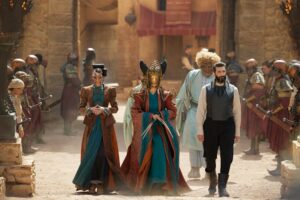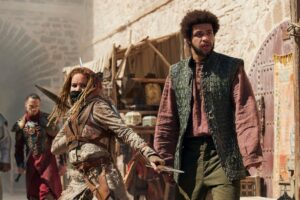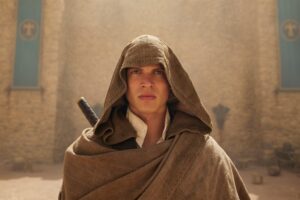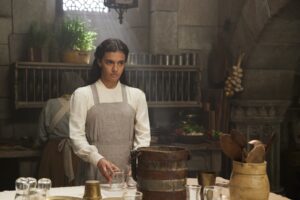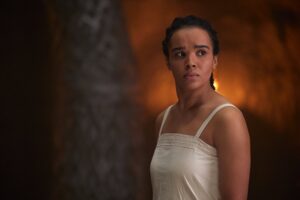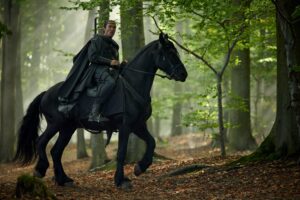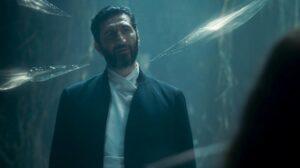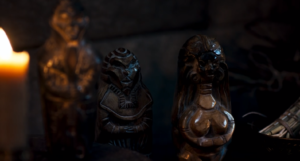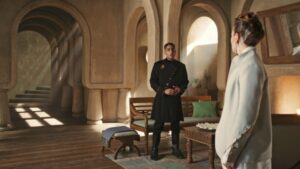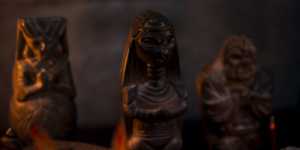This piece was written during the 2023 WGA and SAG-AFTRA strikes. Without the labor of the writers and actors currently on strike, the series being covered here wouldn’t exist.
As I’m sure most of my readers are well aware by now, SAG-AFTRA recently joined the WGA in a historic dual strike as a result of every major studio in Hollywood refusing to protect or even pay their actors, and therefore the cast and showrunner of Amazon’s The Wheel Of Time will not be in attendance at San Diego Comic-Con to promote the fantasy series returning for its second season this September. The release of the season’s first full-length trailer, likely originally scheduled for Thursday to coincide with the now-canceled SDCC panel, has now been moved to Wednesday, and now Nerdist as well as Entertainment Weekly have been given permission to share official screenshots from the trailer and the new season.
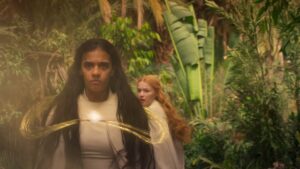
But before we proceed, I want to acknowledge that there has been a great deal of confusion amongst fandoms over how to support the strikes while still hyping up new releases, because while the WGA did not ask for non-union members to halt promotion and discussion of upcoming struck work, SAG-AFTRA is asking for union ‘Influencers’ – and Influencers who plan to join the guild one day – to refrain from doing official promo for any of the AMPTP member studios. What constitutes ‘influence’ and ‘promo’ became the subject of unnecessarily heated discourse on Twitter yesterday and the day before, when in fact SAG-AFTRA has a definition of ‘Influencer’ posted elsewhere on their site, and it very clearly refers to “popular content creators who have amassed a social media following that they capitalize on by making deals with advertisers to promote brands through the Influencer’s creative content which they distribute through their social media feeds [emphasis mine]”. By this definition at least, neither I nor the vast majority of fans using social media to talk about The Wheel Of Time (for example) are Influencers. If you’re still wary, trust the actual members of SAG-AFTRA and the WGA who have had to go online and clarify that there is absolutely nothing wrong with fans discussing struck work, cosplaying characters from struck work, or making fan-art and fanfiction of struck work, as long as you are not accepting advertising deals with AMPTP studios to do so at this time (if you’re already under contract with one, SAG-AFTRA is not telling you to break that contract).
Of course, you can decide not to talk about or engage with struck work in any capacity; just keep in mind that at no point has SAG-AFTRA asked for fans to organize a media blackout as a show of solidarity with the strike, and they have explicitly encouraged audiences not to boycott new releases, so you won’t be a better or worse person whatever you choose to do. That said, you can actually help SAG-AFTRA and the WGA by raising awareness about the strikes on your social media platforms and on your blog/podcast/channel if you have one; donating to the Entertainment Community Fund if you can; and joining actors and writers on the picket-line if you’re able.
Now, back to the new images from The Wheel Of Time. There are six in total, and three are either different angles of shots we’ve seen before. This includes Lan riding a horse through a forest (does he spend all season on his horse?), Perrin brooding, and Ishamael riding with High Lady Suroth and her masked attendant on a Seanchan palanquin. The one that immediately caught my attention depicts Egwene al’Vere standing in a tropical forest, channeling golden threads of the One Power to form a levitating hoop around her, as she faces down an unseen enemy. Book readers should be able to guess what’s happening in this scene adapted from The Great Hunt, but if it’s not immediately clear, note that both Egwene and Elayne Trakand, standing in the background, are wearing their White Tower Novice robes, even though they’re obviously not in the Tower, and Elayne is turning to run away. Yep, this is THAT scene. I don’t want to spoil anything for fans who haven’t read the books, but let’s just say that Madeleine Madden is about to become a star off this scene in particular and I am ready for it.
Can we also take a moment to appreciate how much more visually appealing the One Power looks this season? I didn’t even mind the threads being white throughout the first season, partially because Rosamund Pike’s interpretation of channeling was so elegant and beautiful that quite frankly I hardly noticed, but now that I’ve seen Egwene encompassed in spun gold, I understand at last what we were missing. I want every action sequence from now to include Aes Sedai wielding all the colors of the rainbow (or at least as many colors as there are Elements in the world of The Wheel Of Time, those being fire, water, earth, air, and spirit). And remember, this is just a glimpse of the redesigned female half of the One Power, saidar. The male half, saidin, ought to look completely different because it’s been tainted by the Dark One’s touch…no less colorful, but perhaps more sickly? However it looks, I’m just excited for the show to delve deeper into the Robert Jordan’s complex magic system.

I think that’s exactly what’s happening in the image above, which shows Nynaeve al’Meara and Alanna Mosvani of the Green Ajah meeting in the White Tower kitchens. The only reason Nynaeve would be doing chores there, wearing the same plain gray apron sported by Egwene in a previously-released image, is if she’s still a Novice in this scene, but in The Great Hunt Nynaeve is rushed into her Accepted test almost immediately after arriving at the Tower, before she has time to become a Novice. My theory is that in the show, Nynaeve will initially try to avoid taking the Accepted test for two reasons: firstly, to stay close to Egwene and protect her, but secondly, because the thought of becoming an Aes Sedai, of becoming a stranger in the eyes of the Two Rivers folk she’s tried for so long to fit in with, still terrifies her. And so, even as she begins training with the Power, the ‘block’ she first developed unconsciously as a child to prevent herself from channeling will grow stronger, more indestructible, and seriously impede her progress…which I’m sure is why Alanna is here, to try and nudge Nynaeve along, maybe even to see if her block can be broken down with empowering assurances that she’s stronger than she knows, destined for greater things than being a Wisdom (and it’s a smart choice to build a relationship between these two characters, given that they share a crucial scene down the line).
There’s also the distinct possibility that Alanna is scouting on behalf of her Ajah. In season one, Liandrin Guirale expressed interest in recruiting Nynaeve for the Red Ajah, to which Moiraine Damodred (herself of the Blue Ajah) responded by pointing out that the Wisdom’s extraordinarily powerful Healing weaves might make her a better fit for the Yellow Ajah, but I’m sure that every woman in the White Tower will be vying for her time and watching carefully to see which Ajah she gravitates towards, because any one would benefit immensely from counting her amidst its ranks, while all the others would stand to lose. Never before has the Tower been so weak or so divided against itself that the arrival of one woman, even with potential as great as Nynaeve’s, could incite a conflict between Ajahs for ownership of her allegiances, but that’s just how things are done now. It’s another sign that the Last Battle is coming, and nothing built to last will be left standing in the wake of that long-awaited cosmic duel between the Dark One and the Dragon Reborn.
Speaking of the Dragon Reborn, Rand al’Thor has acquired some nice new clothes and shaved his head since his confrontation with Ishamael at the Eye of the World in season one, presumably to avoid being recognized by Darkfriends or mistaken for an Aiel in his hiding-place of Cairhien, a kingdom still recovering from invasion by mysterious red-haired warriors who came across the Spine of the World one day to take vengeance on Cairhien’s former king for a crime he never knew he had committed, and returned by the way they had come once he was dead and his city lay in ruins. In the years since, though the Aiel seem to have no further interest in what happens there, Cairhien has not ceased to be used as a battlefield in the complex interplay of swords and subtlety that the Cairhienian nobility call Daes Dae’mar, the Game of Houses, a dangerous game where ulterior motive and hidden agenda is applied to every person’s actions and words, however trivial, and all the Houses respond in turn with assassins.

Rand has no understanding of how the Game works when he first enters Cairhien wearing a fancy coat that accidentally marks him as a lord, but in the books he’s accompanied by Hurin, a Shienaran sniffer conveniently well-versed in the rules of Daes Dae’mar. Because Hurin is less of a fully fleshed-out character than he is a walking encyclopedia spouting exposition, I don’t expect to see him in season two, and it will almost certainly be Moiraine who acts as Rand’s mentor in his place, which only makes sense seeing as she actually belongs to one of Cairhien’s noble families, played the Game of Houses frequently as a girl and still relies on the skills she picked up there even now, as an Aes Sedai of the surveilling Blue Ajah, and remains to this day a potential contender for the kingdom’s throne. Ruling Cairhien is the last thing on Moiraine’s mind, I’m certain, but having been shielded by Ishamael and exiled from the White Tower, she is in desperate need of allies heading into season two, and House Damodred would be happy to welcome her back if she could lead them to believe that she was sent by the White Tower to facilitate their conspiracy against the current king. That’s where Rand comes in, I’m sure, lying for her (because even shielded, she’s still bound by the Three Oaths), and maybe even using the One Power to cover for her.
What do you think of the new images, and what do you hope to see in season two of The Wheel Of Time? Share your own thoughts, theories, and opinions, in the comments below!
